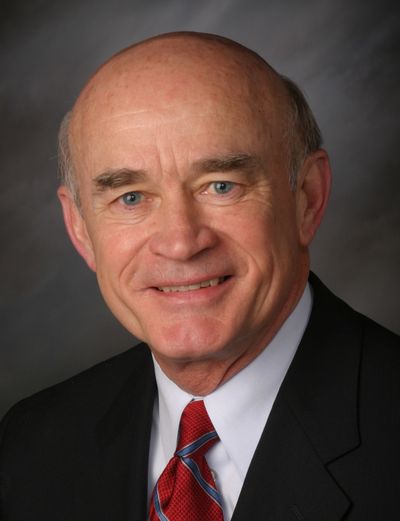GSI leader leaving in April
Hadley led chamber of commerce for 20 years

Rich Hadley plans to leave his 20-year career leading the region’s largest chamber of commerce. He will step down in April.
Hadley, 66, became chief executive officer and president of Greater Spokane Chamber of Commerce in 1993. In 2007, the business-advocacy group changed its name to Greater Spokane Incorporated.
In those 20 years, Hadley became a business fixture and honed GSI’s reputation for building consensus among regional leaders and economic development groups and for focusing lobbying efforts at the federal and state level.
GSI is the only group of its kind in the Northwest to have full-time paid lobbyists both in Olympia and in Washington, D.C., Hadley said.
“What we are doing now (in developing ongoing relationships with elected officials) just wasn’t going on before,” Hadley said of GSI’s focused lobbying.
A former U.S. Navy air intelligence officer during the Vietnam War, Hadley also forged a strong relationship with Air Force officials, becoming one of the region’s foremost advocates for protecting Fairchild Air Force Base and boosting its future role.
Hadley said he’s not planning to fully retire. After stepping down, he plans to take on occasional projects that he feels he can assist with or manage for GSI, he said.
He also plans to travel more with his wife, Rita, and visit his two grown children.
“I also plan on taking more lessons to learn to play the piano,” Hadley said.
GSI’s board announced it will form a committee to conduct a national search for a new chief executive.
Shawn Cross, who served on the GSI board until running for Congress in 2003, said Hadley did a stellar job and maintained the chamber’s focus during a challenging period of economic ups and downs and local political strife.
“Being a CEO anywhere for 20 years is a long time. It’s a tribute to Rich’s ability and leadership that he remained there and continued being effective,” said Cross, CEO of Spokane law firm Lee & Hayes.
One key change Cross credits Hadley with is focusing local groups to work together in seeking construction money from state legislators. “We used to have area groups compete and fight with each other in trying to get projects in the state budget,” Cross said.
GSI convinced area leaders to work together and present their projects to the chamber first. GSI then assigned priorities to the projects and developed a common strategy for approaching state officials with those requests.
Hadley also initiated an annual “fly-in” to Washington, D.C., by a group of area officials, business leaders and educators. He made sure the group included North Idaho members to help focus on initiatives helpful to the entire region.
Hadley’s decision did not surprise the GSI board.
He had already informed the current board president, Jeff Philips, CEO of Rosauers, and President-elect Mike Senske, CEO of Pearson Packaging.
“I feel we have a great organization, an exceptional staff and a diverse leadership,” Hadley said. “I feel really good about where we are as an organization.”
The major accomplishment of his tenure here, he added, is the successful formation of a medical school at the Riverpoint campus.
Starting in 2002, that chamber-led effort required ongoing discussions and collaboration with the state’s universities and lawmakers.
In 2011, state legislators approved $35 million to begin construction of Washington State University Spokane’s medical education building. By 2013, the medical training program had 80 student slots, and it is expected to grow.
“I feel satisfaction in that we took a project and stayed with it for basically 10 years and built tremendous partnerships,” Hadley said. “It felt very good that we were able to bring together a coalition to make that happen.” Shelley Redinger, Spokane Public Schools superintendent, joined the GSI board in 2012 when she assumed that job. She said Hadley has impressed her with the ability to form consensus.
“He’s very good at connecting people and getting people to rally around issues,” Redinger said.